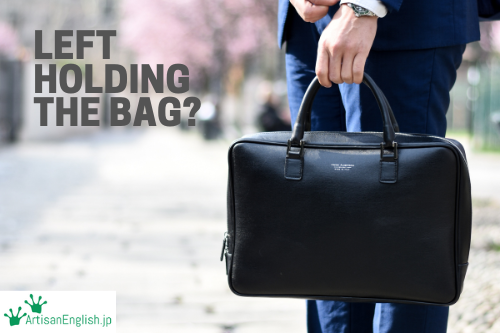
YouTube / iTunes / Spotify / Radio Public / Pocket Casts / Google Podcasts / Breaker / Overcast
Listen to ArtisanEnglish.jp posts & lesson intros here.
Phrase: Left holding the bag
Have you ever had the responsibility for something unceremoniously dumped on you?
If you have, you know how it feels to be left holding the bag.
If you know what I mean, things like that tend to happen to people further down the totem pole.
To be clear, when you’re left holding the bag, you’re put in a situation where you’re suddenly accountable for what was supposed to be someone else’s responsibility.
I’m going to take Nissan as an example today.
It’s not the best example, but it’s one with which all Japanese should be familiar.
If you believe the reports, there’s been a lot of navel-gazing at Nissan for the last 20 years.
Carlos Ghosn is alleged to have built quite a nest egg while working there.
It’s also been stated that he abused company funds to cover his economic losses, benefit friends, etc.
Mr. Ghosn is no longer associated with Nissan.
He has been ousted, and, for the moment at least, Hiroto Saikawa, the current CEO of Nissan, has been left holding the bag.
Most people seem to agree that Carlos Ghosn has created all of the problems Nissan now has.
Nissan’s profit is falling quickly, and its cars are outdated and stale.
There’s a battle for control going on between Renault and the company.
It’s a big mess, and Hiroto Saikawa is the one left holding the bag having to stand (or sit) in front of shareholders and the general public to explain the plan for the future.
Of course, nothing has been confirmed.
Everyone is presumed innocent until proven guilty in democratic countries.
The bottom line is that Carlos Ghosn is in a very sticky situation, Nissan is in financial difficulties, and Hiroto Saikawa has a lot of questions to answer.
Unfortunately for him, he’s the one left holding the bag.
The thing I want to know most of all is – what’s in the bag?
Flesch-Kincaid Readability Test
This post is understandable by someone with at least an 8th-grade education (age 13 – 14).
On the Flesch-Kincaid reading-ease test, this post scores 67.
The easier a passage is to read, the higher the score on a scale of 0 – 100.

